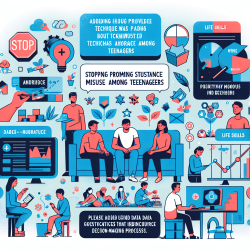Introduction
In the ever-evolving field of academic medicine, diversity and inclusion are not just buzzwords but essential components for fostering innovation and improving healthcare outcomes. A recent study titled "The impact of underrepresented minority or marginalized identity status on training outcomes of MD-PhD students" sheds light on the disparities faced by students from underrepresented and marginalized groups in MD-PhD programs. This blog explores how practitioners can leverage these findings to enhance their skills and create more equitable training environments.
Understanding the Barriers
The study identifies four key barriers that impact the training outcomes of underrepresented and marginalized students in MD-PhD programs:
- Discrimination and Bias: Students often face microaggressions and discriminatory attitudes, which negatively affect their well-being and academic performance.
- Impostor Syndrome and Stereotype Threat: The pressure to overcome negative stereotypes can lead to increased anxiety and reduced performance.
- Lack of Identity-Similar Mentors: The absence of mentors who share similar identities can hinder students' ability to navigate academic challenges effectively.
- Suboptimal Institutional Policies: Policies that do not adequately support diverse needs can exacerbate existing disparities.
Implementing Evidence-Based Solutions
To address these barriers, the study recommends several goal-oriented interventions:
- Diversify Mentorship Networks: Encourage the recruitment of diverse faculty and provide training in culturally-aware mentorship to create a supportive environment for all students.
- Support Academic Milestones: Implement peer-to-peer mentorship programs and create student groups to assist with transitions between training phases.
- Facilitate Access to Opportunities: Leverage existing grants and professional development opportunities specifically designed for underrepresented students.
- Transition to Pass/Fail Grading: Adopt pass/fail grading systems for pre-clinical training to alleviate performance pressures and reduce impostor syndrome.
- Create Safe Spaces for Discussion: Organize workshops and group discussions to educate students and faculty about diversity, equity, and inclusion issues.
Encouraging Further Research
While the study provides valuable insights, it also highlights the need for further research, particularly on the intersectionality of different identities and how they exacerbate disparities. Practitioners are encouraged to explore these areas to develop more comprehensive strategies for supporting underrepresented and marginalized students.
Conclusion
By implementing the evidence-based solutions outlined in the study, practitioners can play a crucial role in creating more inclusive and supportive training environments for MD-PhD students. This not only benefits the students but also enriches the field of academic medicine as a whole.
To read the original research paper, please follow this link: The impact of underrepresented minority or marginalized identity status on training outcomes of MD-PhD students.










